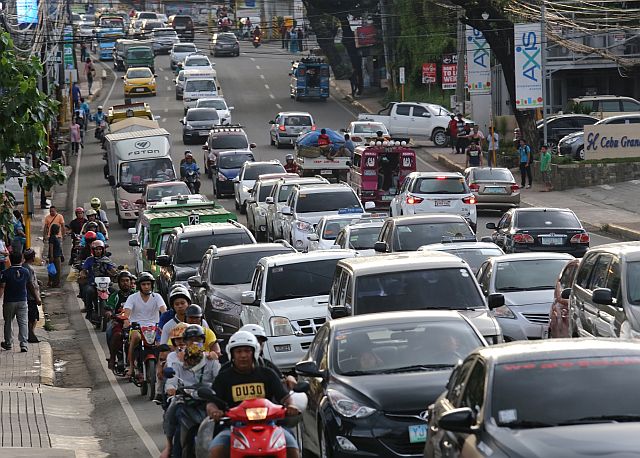
Schools may be closed for the holiday season but traffic is still heavy in Escario Street. But Cebu business leaders like Philip Tan, Alan Gordon Joseph and Melanie Ng call on Cebu residents to stay positive. (CDN PHOTO/JUNJIE MENDOZA)
Strict enforcement of traffic laws may reduce congestion by 10 percent, say traders
Six months into the Duterte administration, Cebu’s traffic problem had not been solved as promised, said business leaders here.
“What improvement have you seen? Before, when you wake up at 6:30 (a.m.) and hit the road at 7 (a.m.), you can still arrive at your destination at 8 (a.m.). Now, you have to wake up an hour earlier,” said Mandaue Chamber of Commerce and Industry (MCCI) past president Philip Tan.
Cebu Business Club (CBC) president Gordon Alan Joseph noticed very minimal improvement since traffic discipline and law enforcement are not addressed consistently.
The Duterte administration vowed to solve the country’s traffic situation in key cities including Metro Cebu and asked for emergency powers from Congress to address gaps without going through tedious bureaucratic processes.
“If there were consistent and strict enforcement (of traffic laws), I think the traffic could improve even without emergency powers for infrastructure,” Joseph said.
Tan said while he had not seen any improvement in Cebu’s worsening traffic in the last six months, he didn’t expect changes to happen in less than two years.
“Let us be positive. Improvements will happen because of the leadership, but right now, we can’t improve on something that still needs to be corrected,” he said.
Tan said correcting undisciplined drivers and poor infrastructure should be done first before any improvement is seen.
“Right now, we cannot undo something that has been happening for so many years in just six months,” he said.
Since the Duterte administration ramped up infrastructure spending, Tan said the challenge now is to reeducate drivers on road discipline.
(From left) CBC president Gordon Alan Joseph, CCCI Melanie Ng abd MCCI past president Philip Tan
He said “discipline” involves pulling over at designated stops, heeding traffic signals and giving way, among others.
Tan said discipline and strict enforcement of existing rules in local government units will result in a “slight” improvement in Cebu’s traffic situation, even without the solutions the government is proposing.
Joseph said it will take at least five years before real and significant infrastructure-driven improvements could be felt.
“But I believe with proper enforcement of the law as well as driver and public education, there might just be a 10 to 15 percent reduction in traffic (congestion),” he said.
Joseph said stakeholders should address aspects of the problem that are “doable| including information drives for drivers and the public in general on traffic issues.
Cebu Chamber of Commerce and Industry (CCCI) president Melanie Ng said she was positive the traffic situation in Metro Cebu would be solved through initiatives from a strong partnership between the public and private sectors in the region.
“All stakeholders are really working hard to find out what can be done for all our infrastructure issues,” she said.
Among the infrastructure projects seen to decongest traffic in Metro Cebu are a bridge linking Cebu City to Cordova.
This would allow people to reach Mactan Island without passing through Mandaue City, where vehicles from all directions converge.
Another one is Cebu City’s Bus Rapid Transit (BRT) project worth P10.6 billion, which may be delayed for another year after the previous administration failed to sign the project’s consultancy contracts.
Work on the project was originally slated for the early part of 2017 and expected to be operational the following year.
A feasibility study would be conducted for a bypass road through Mandaue City and Consolacion and Liloan towns, to ease up traffic along the present Tayud-Liloan road.
The Mega Cebu Development and Coordinating Board (MCDCB) is seeking the approval of a feasibility study for the proposed traffic management plan for Metro Cebu, which looks at area traffic control, urban transport and transit management.
The study, which will be funded by the Japan International Cooperation Agency (Jica), is being lobbied by the Office of the Presidential Assistant for the Visayas (OPAV) to the national government.